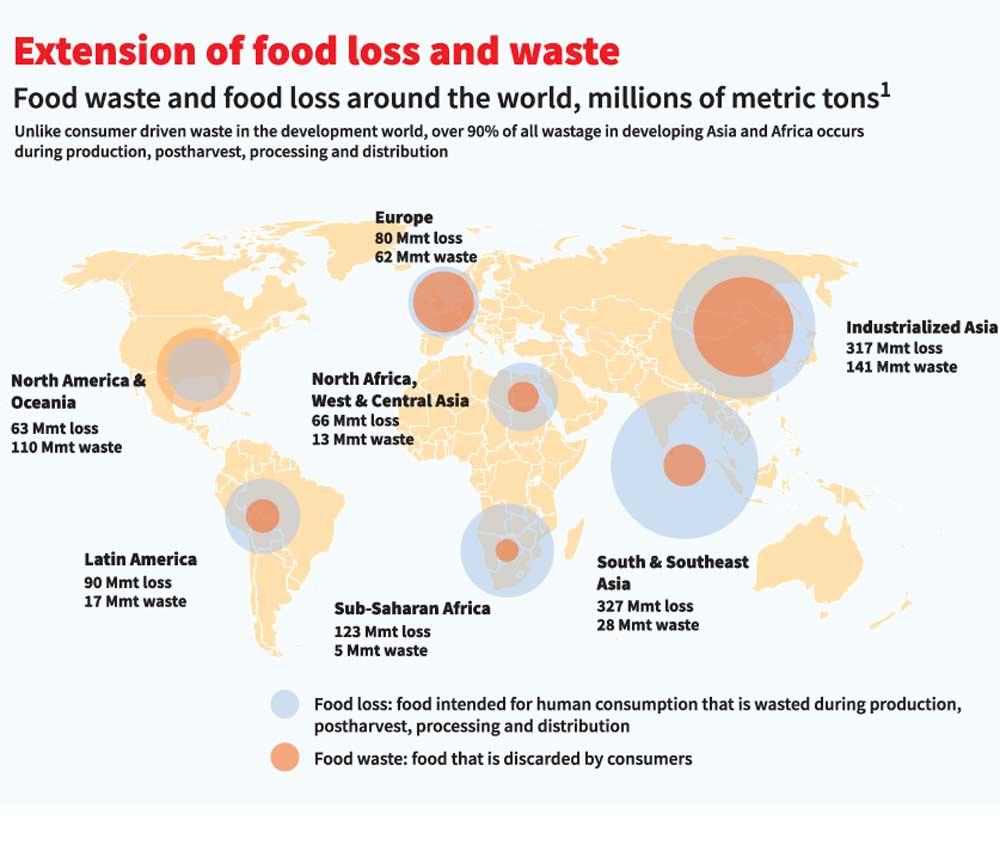13 Nov 2024 - {{hitsCtrl.values.hits}}

 About 1.3 billion tons of foods are wasted every year worldwide. That means roughly one third of food produced for human consumption is lost or wasted globally. This enormous wastage exists at the same time as one billion people in the world are suffering and dying from hunger. Food is lost or wasted throughout the food supply chain (FSC) from initial agricultural production down to final household consumption. Food loss and waste have many negative ecological, economic, ethical and cultural impacts. Food losses represent a waste of resources used in production such as land, water, energy and inputs. Producing food that will not be consumed leads to unnecessary CO 2 emission in addition to loss of economic value of the food produced. Ultimately, using up further resources for its management. The purpose of this study is to identify the extent, causes and prevention of global food losses and waste.
About 1.3 billion tons of foods are wasted every year worldwide. That means roughly one third of food produced for human consumption is lost or wasted globally. This enormous wastage exists at the same time as one billion people in the world are suffering and dying from hunger. Food is lost or wasted throughout the food supply chain (FSC) from initial agricultural production down to final household consumption. Food loss and waste have many negative ecological, economic, ethical and cultural impacts. Food losses represent a waste of resources used in production such as land, water, energy and inputs. Producing food that will not be consumed leads to unnecessary CO 2 emission in addition to loss of economic value of the food produced. Ultimately, using up further resources for its management. The purpose of this study is to identify the extent, causes and prevention of global food losses and waste.
Food is lost or wasted throughout the food supply chain (FSC) from initial agricultural production down to final household consumption. On a per capita basis, much more food is wasted by consumers in developed countries (Europe, North America, Oceania and Industrialized Asia) than in developing countries (Sub-Sahara Africa; North Africa, West and Central Africa; South and Southeast Asia; Latin America).
According to the literature, in developed countries food is to great extent wasted at the consumption level, meaning that it is thrown away even if it is still suitable for human consumption. Significant food loss and waste however, also occur at the early stages of FSC. This is mainly related to consumer behaviour as well as lack of coordination between different actors in the food supply chain. Also due to quality standards, which reject food items not compiled to it still taste and nutritional value are not affected.
Insufficient purchase planning, confusing about “best before” and “use by” date and areless attitude of those consumers who can afford to waste food. This waste in developed countries can be reduced by raising awareness among food industries, retailers and consumers and finding out good and beneficial use for safe food that is presently discarded. In developing countries, food is lost mostly during the early and middle stages of the FSC and much less at the consumer level.
The causes of food losses and waste mainly connected to financial, managerial and technical limitations in harvesting techniques, storage and cooling facilities in hot climate conditions, infrastructures, packaging and marketing systems. Food losses in those countries can be reduced by investing in infrastructure, transportation, food industries and packaging industries and strengthening the FSC by encouraging small farmers to organize and to diversify and upscale their production and marketing.
Food security is major concern in large part of the developing world. Food production must increase significantly to meet the future demand of an increasing world population.
Promotion of the reduction of food losses and waste has a considerable potential to increase the efficiency of whole FSC. In the world, with limited natural resources (land, water, energy, fertilizer etc.) reduction of food losses plays a major role in finding of cost-effective solutions to produce enough safe and nutritious food for all. In developing countries, solution should be made at producer level (e.g. investment in infrastructure and transportation) while in developed countries, it should be made at the consumer level (e.g. need to informed and change the behavior which causes the current high level of food waste).
The FSC of today is more and more globalized. Certain food are produced in one part, transported and consumed at very different parts of the world. Across the FSC, better measuring and monitoring system of food loss and waste is needed. The food losses reduction targets need to be set at global, national (different countries), sub-national (province and cities) and corporate (companies) levels. Increasing of the investment in reducing post-harvesting losses in developing countries through a participation of public and private sectors is required. Raising awareness program in school and political initiatives are possible starting points to change people’s attitudes in developed countries towards the current massive food waste. Increasing of corporation among actors in the FSC (household, companies, farmers, policy makers and more) to reduce the food losses is required.
(The writer is the Deputy Government Analyst Food – water & liquor Division Government Analyst Department)
25 Dec 2024 2 hours ago
25 Dec 2024 2 hours ago
25 Dec 2024 3 hours ago
25 Dec 2024 4 hours ago
25 Dec 2024 5 hours ago